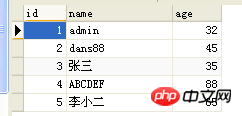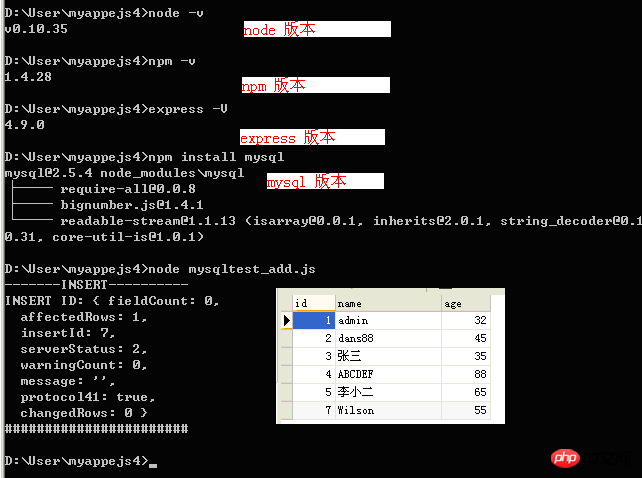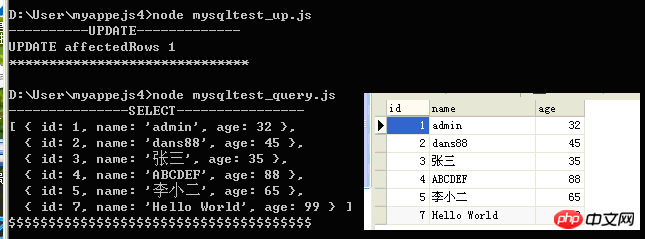Use Nodejs to connect to mysql to implement basic operations
This article mainly introduces the method of Nodejs connecting to mysql and realizing the operations of adding, deleting, modifying and querying. It combines the example form with a detailed analysis of the connection of nodejs to mysql database, the creation of mysql database and the nodejs adding, deleting, modifying and querying of mysql. For specific implementation skills of related operations, friends in need can refer to
This article describes how Nodejs connects to mysql and implements add, delete, modify, and check operations. Share it with everyone for your reference, the details are as follows:
1. Prepare
nodejs tutorials, most of which use mongodb as an example. However, mongodb has some limitations, which are stated on the official website. I plan to use MySQL because I still have some experience using it. Focus on research first. node-mysql is currently the most popular mysql driver under node. I used it initially, because the asynchronous callback method really has a lot of pitfalls.
The package name of the following project is mysql, and the version is mysql@ 2.5.4
First explain the code shown below, which all starts with the following code, and will not be explained later
var connection = mysql.createConnection({
host : '127.0.0.1',
user : 'root',
password : 'root123',
port: '3306',
database: 'my_news_test',
});The meaning of the code is very straightforward. If you want to go deeper, you can go to the official website above to check. Configurations such as host and user should be clear to those who have written MySQL database applications. Please modify the corresponding parameters by yourself. The following code assumes that there is a table called node_use in the database "my_news_test". The table has 3 attributes
id: auto-increment primary key
name: The name has unique restrictions.
age: Age
Test MySQL MySQL version: 5.5
2. Create a database and insert 5 entries Record
Source Database : my_news_test SET FOREIGN_KEY_CHECKS=0; -- ---------------------------- -- Table structure for node_user -- ---------------------------- DROP TABLE IF EXISTS `node_user`; CREATE TABLE `node_user` ( `id` int(11) NOT NULL AUTO_INCREMENT, `name` varchar(30) DEFAULT NULL, `age` int(8) DEFAULT NULL, PRIMARY KEY (`id`) ) ENGINE=InnoDB AUTO_INCREMENT=6 DEFAULT CHARSET=utf8; -- ---------------------------- -- Records of node_user -- ---------------------------- INSERT INTO `node_user` VALUES ('1', 'admin', '32'); INSERT INTO `node_user` VALUES ('2', 'dans88', '45'); INSERT INTO `node_user` VALUES ('3', '张三', '35'); INSERT INTO `node_user` VALUES ('4', 'ABCDEF', '88'); INSERT INTO `node_user` VALUES ('5', '李小二', '65');
3. Test the environment first
1. First you need to install the mysql package of nodejs
D:\User\myappejs4>npm install mysql mysql@2.5.4 node_modules\mysql ├── require-all@0.0.8 ├── bignumber.js@1.4.1 └── readable-stream@1.1.13 (inherits@2.0.1, string_decoder@0.10.31, isarray@0 .0.1, core-util-is@1.0.1)
2. Write code for interaction between nodejs and mysql
//mysql.js
//首先需要安装nodejs 的mysql包
//npm install mysql
//编写nodejs与mysql交互的代码
var mysql = require('mysql');
var TEST_DATABASE = 'my_news_test';
var TEST_TABLE = 'node_user';
//创建连接
var client = mysql.createConnection({
user: 'root',
password: 'root123',
});
client.connect();
client.query("use " + TEST_DATABASE);
client.query(
'SELECT * FROM '+TEST_TABLE,
function selectCb(err, results, fields) {
if (err) {
throw err;
}
if(results)
{
for(var i = 0; i < results.length; i++)
{
console.log("%d\t%s\t%s", results[i].id, results[i].name, results[i].age);
}
}
client.end();
}
);3. Running results
D:\User\myappejs4>node mysqltest.js 1 admin 32 2 dans88 45 3 张三 35 4 ABCDEF 88 5 李小二 65

4. Node. js combined with MySQL's add, delete, modify, and query operations
1, add
var mysql = require('mysql');
var connection = mysql.createConnection({
host : '127.0.0.1',
user : 'root',
password : 'root123',
port: '3306',
database: 'my_news_test',
});
connection.connect();
var userAddSql = 'INSERT INTO node_user(id,name,age) VALUES(0,?,?)';
var userAddSql_Params = ['Wilson', 55];
//增 add
connection.query(userAddSql,userAddSql_Params,function (err, result) {
if(err){
console.log('[INSERT ERROR] - ',err.message);
return;
}
console.log('-------INSERT----------');
//console.log('INSERT ID:',result.insertId);
console.log('INSERT ID:',result);
console.log('#######################');
});
connection.end();run as follows
D:\User\myappejs4>node mysqltestadd.js
-------INSERT----------
INSERT ID: { fieldCount: 0,
affectedRows: 1,
insertId: 6,
serverStatus: 2,
warningCount: 0,
message: '',
protocol41: true,
changedRows: 0 }
#######################
2. Change
var mysql = require('mysql');
var connection = mysql.createConnection({
host : '127.0.0.1',
user : 'root',
password : 'root123',
port: '3306',
database: 'my_news_test',
});
connection.connect();
var userModSql = 'UPDATE node_user SET name = ?,age = ? WHERE id = ?';
var userModSql_Params = ['Hello World',99,7];
//改 up
connection.query(userModSql,userModSql_Params,function (err, result) {
if(err){
console.log('[UPDATE ERROR] - ',err.message);
return;
}
console.log('----------UPDATE-------------');
console.log('UPDATE affectedRows',result.affectedRows);
console.log('******************************');
});
connection.end();and the running result is as follows
D:\User\myappejs4>node mysqltest_up.js ----------UPDATE------------- UPDATE affectedRows 1 ******************************
3. Check the operation
var mysql = require('mysql');
var connection = mysql.createConnection({
host : '127.0.0.1',
user : 'root',
password : 'root123',
port: '3306',
database: 'my_news_test',
});
connection.connect();
var userGetSql = 'SELECT * FROM node_user';
//查 query
connection.query(userGetSql,function (err, result) {
if(err){
console.log('[SELECT ERROR] - ',err.message);
return;
}
console.log('---------------SELECT----------------');
console.log(result);
console.log('$$$$$$$$$$$$$$$$$$$$$$$$$$$$$$$$$$$$$$');
});
connection.end();and the running result is as follows
D:\User\myappejs4>node mysqltest_query.js
---------------SELECT----------------
[ { id: 1, name: 'admin', age: 32 },
{ id: 2, name: 'dans88', age: 45 },
{ id: 3, name: '张三', age: 35 },
{ id: 4, name: 'ABCDEF', age: 88 },
{ id: 5, name: '李小二', age: 65 },
{ id: 6, name: 'Wilson', age: 55 } ]
$$$$$$$$$$$$$$$$$$$$$$$$$$$$$$$$$$$$$$
4. Delete operation
var mysql = require('mysql');
var connection = mysql.createConnection({
host : '127.0.0.1',
user : 'root',
password : 'root123',
port: '3306',
database: 'my_news_test',
});
connection.connect();
var userDelSql = 'DELETE FROM node_user WHERE id = 7';
//ɾ
connection.query(userDelSql,function (err, result) {
if(err){
console.log('[DELETE ERROR] - ',err.message);
return;
}
console.log('-------------DELETE--------------');
console.log('DELETE affectedRows',result.affectedRows);
console.log('&&&&&&&&&&&&&&&&&');
});
connection.end();
运行的结果如下
D:\User\myappejs4>node mysqltest_del.js
-------------DELETE--------------
DELETE affectedRows 1
&&&&&&&&&&&&&&&&&&&&&&&&&&&&&&&&&&
The above is what I compiled for everyone. I hope it will be helpful to everyone in the future.
Related articles:
How to package static resources in vue
What are the usages of async&await in Koa2?
In the zTree tree plug-in, how to implement click-loading in five-level regions across the country
How to implement node express personalized chat rooms?
The above is the detailed content of Use Nodejs to connect to mysql to implement basic operations. For more information, please follow other related articles on the PHP Chinese website!

Hot AI Tools

Undresser.AI Undress
AI-powered app for creating realistic nude photos

AI Clothes Remover
Online AI tool for removing clothes from photos.

Undress AI Tool
Undress images for free

Clothoff.io
AI clothes remover

Video Face Swap
Swap faces in any video effortlessly with our completely free AI face swap tool!

Hot Article

Hot Tools

Notepad++7.3.1
Easy-to-use and free code editor

SublimeText3 Chinese version
Chinese version, very easy to use

Zend Studio 13.0.1
Powerful PHP integrated development environment

Dreamweaver CS6
Visual web development tools

SublimeText3 Mac version
God-level code editing software (SublimeText3)

Hot Topics
 MySQL: An Introduction to the World's Most Popular Database
Apr 12, 2025 am 12:18 AM
MySQL: An Introduction to the World's Most Popular Database
Apr 12, 2025 am 12:18 AM
MySQL is an open source relational database management system, mainly used to store and retrieve data quickly and reliably. Its working principle includes client requests, query resolution, execution of queries and return results. Examples of usage include creating tables, inserting and querying data, and advanced features such as JOIN operations. Common errors involve SQL syntax, data types, and permissions, and optimization suggestions include the use of indexes, optimized queries, and partitioning of tables.
 MySQL's Place: Databases and Programming
Apr 13, 2025 am 12:18 AM
MySQL's Place: Databases and Programming
Apr 13, 2025 am 12:18 AM
MySQL's position in databases and programming is very important. It is an open source relational database management system that is widely used in various application scenarios. 1) MySQL provides efficient data storage, organization and retrieval functions, supporting Web, mobile and enterprise-level systems. 2) It uses a client-server architecture, supports multiple storage engines and index optimization. 3) Basic usages include creating tables and inserting data, and advanced usages involve multi-table JOINs and complex queries. 4) Frequently asked questions such as SQL syntax errors and performance issues can be debugged through the EXPLAIN command and slow query log. 5) Performance optimization methods include rational use of indexes, optimized query and use of caches. Best practices include using transactions and PreparedStatemen
 Why Use MySQL? Benefits and Advantages
Apr 12, 2025 am 12:17 AM
Why Use MySQL? Benefits and Advantages
Apr 12, 2025 am 12:17 AM
MySQL is chosen for its performance, reliability, ease of use, and community support. 1.MySQL provides efficient data storage and retrieval functions, supporting multiple data types and advanced query operations. 2. Adopt client-server architecture and multiple storage engines to support transaction and query optimization. 3. Easy to use, supports a variety of operating systems and programming languages. 4. Have strong community support and provide rich resources and solutions.
 How to connect to the database of apache
Apr 13, 2025 pm 01:03 PM
How to connect to the database of apache
Apr 13, 2025 pm 01:03 PM
Apache connects to a database requires the following steps: Install the database driver. Configure the web.xml file to create a connection pool. Create a JDBC data source and specify the connection settings. Use the JDBC API to access the database from Java code, including getting connections, creating statements, binding parameters, executing queries or updates, and processing results.
 How to start mysql by docker
Apr 15, 2025 pm 12:09 PM
How to start mysql by docker
Apr 15, 2025 pm 12:09 PM
The process of starting MySQL in Docker consists of the following steps: Pull the MySQL image to create and start the container, set the root user password, and map the port verification connection Create the database and the user grants all permissions to the database
 MySQL's Role: Databases in Web Applications
Apr 17, 2025 am 12:23 AM
MySQL's Role: Databases in Web Applications
Apr 17, 2025 am 12:23 AM
The main role of MySQL in web applications is to store and manage data. 1.MySQL efficiently processes user information, product catalogs, transaction records and other data. 2. Through SQL query, developers can extract information from the database to generate dynamic content. 3.MySQL works based on the client-server model to ensure acceptable query speed.
 Laravel Introduction Example
Apr 18, 2025 pm 12:45 PM
Laravel Introduction Example
Apr 18, 2025 pm 12:45 PM
Laravel is a PHP framework for easy building of web applications. It provides a range of powerful features including: Installation: Install the Laravel CLI globally with Composer and create applications in the project directory. Routing: Define the relationship between the URL and the handler in routes/web.php. View: Create a view in resources/views to render the application's interface. Database Integration: Provides out-of-the-box integration with databases such as MySQL and uses migration to create and modify tables. Model and Controller: The model represents the database entity and the controller processes HTTP requests.
 How to install mysql in centos7
Apr 14, 2025 pm 08:30 PM
How to install mysql in centos7
Apr 14, 2025 pm 08:30 PM
The key to installing MySQL elegantly is to add the official MySQL repository. The specific steps are as follows: Download the MySQL official GPG key to prevent phishing attacks. Add MySQL repository file: rpm -Uvh https://dev.mysql.com/get/mysql80-community-release-el7-3.noarch.rpm Update yum repository cache: yum update installation MySQL: yum install mysql-server startup MySQL service: systemctl start mysqld set up booting






